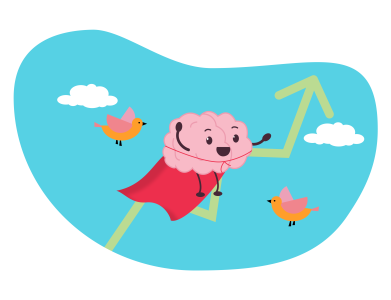
- GRIP Learning's Team
Today you’ll learn about neuroplasticity and the ways to increase it! Here are some guides on how to increase neuroplasticity through ...
How often do you hear your kid say they feel like a “failure?” Your kid might feel that they aren’t good enough at everything, from schoolwork to sports to playing board games with the family. Here are some excellent strategies for assisting your children to overcome failures but let’s define first what failure is.
Children have a hard time relating to failing, and as adults, we want nothing more than for our charges to excel in our classrooms and in life. However, what if we accepted that mistakes are valuable learning experiences?
Failure is a vital part of succeeding (not the opposite). Whenever we experience setbacks, our brains adapt and improve. For children who understand this idea, the possibilities are limitless.
Today’s society places great expectations on everyone from a young age, and not just in terms of academic performance but also in terms of athletic prowess and social success. To a child, this can feel like an especially heavy burden to bear.
Parents are in the ideal position to teach their children the skills they’ll need to thrive in the face of the many challenges they’ll inevitably encounter throughout life. But how are you going to achieve this?
It’s only natural to want to keep your child safe from harm at all costs, yet doing so may actually be doing more harm than good. Teaching your child to bounce back from setbacks is an important part of raising a resilient person.

To begin, always keep in mind that you are not alone in experiencing failure. Everyone has setbacks in various areas of life. Even the most accomplished academics, athletes, businesspeople, and politicians will surely have setbacks in their lives. With your support, your child’s perceived failures can become stepping stones on the path to a successful and fulfilling adulthood.
Whether you’re working with a child, an adolescent, or yourself, these suggestions can be helpful in assisting a child to overcome failures.
Building a “growth mindset” has proven to give children a leg up in life. And it changes how they deal with setbacks in general.
A recent study found that kids with growth mindsets have a more positive brain response to failure than kids with fixed mindsets. As a result, they were more likely to strive to do better.
Kids with growth mindsets were better able to use setbacks as opportunities for progress by analyzing what went wrong and considering alternative solutions.
Have you learned anything? Find out what went wrong and figure out how to fix it. The opportunity to learn lies within every failure.
Help your child learn to see the bright side of things by discussing the scenario with them. Even if they lost the game but scored a goal, or if they didn’t get an A but raised their prior score, they can still feel good about themselves.
Even if they didn’t succeed in getting what they wanted, they probably learned something valuable or accomplished some modest goals.
It’s natural to feel down after a loss or failure, but doing so can prevent you from moving forward.
As the old adage goes, “don’t be a sore loser,” and if you lose a sporting event, you should accept it with a grin and congratulate your opponent. Even if you didn’t win, it’s still good sportsmanship to shake hands with the other players afterward.
Don’t put the blame on anyone else or try to find a way out. Be accountable, acknowledge your mistakes, and grow as a result.
Any success or failure in a team activity, such as a sport, belongs to the group as a whole. When a teammate has a golden opportunity in the final seconds and misses it, it’s not fair to hold them responsible for the loss. It’s important to take the loss as a team, just like you would if they’d scored.
Your kid probably doesn’t feel like it right now, but everyone experiences failures in life.
No matter how many times you screw up, life keeps going.
In the end, it doesn’t matter if your kid wins or loses, as long as they know they gave it their all.
Make sure your kid knows this on a regular basis, especially before stressful events like tests, games, and other competitions. There is nothing more anyone can ask of us than our absolute best effort.
No single setback can define you. You can and will move on to much greater and better things, regardless of how big this one seems right now.
Keep in mind that any setback is an opportunity to learn and try again, or to attempt something entirely different. You shouldn’t give up because of a single failure.
To help your child grow, remind them they can seek out the guidance of an adult they look up to (you, a teacher, a coach, etc.) and actively take in that advice.
Everyone has a distinct idea of what constitutes success; therefore, you should set your own standards. To develop to your fullest potential, you must often challenge yourself to leave your safe zone. Think of yourself as someone who is willing to take risks instead of someone who keeps failing.
As long as you take what you learn from setbacks and use it to improve yourself, you can emerge from the experience stronger and more capable than before.
If you want to teach your child anything, it’s that it’s better to try and fail than to never try at all.
There are many well-known individuals who have experienced failures along their journeys to success but have ultimately used those setbacks as inspirations for even greater achievements. You never know how these stories of sticking with something even when things get hard will affect your child.
Disney was fired from the newspaper industry due to his lack of creativity. Before he made one of the most well-known brands in the world, he went bankrupt with his first business.
Abraham Lincoln lost six statewide and national elections before he was finally successful in running for president of the United States.
Mathew Tait, a rugby player, was hailed as “the future of English rugby” after earning his first cap at the age of 18. Inexplicably, after only one game, his fantasy was destroyed when he was cut. He suffered a blow to his self-assurance but persevered and eventually made 38 appearances for his country.
Lionel Messi wasn’t allowed to play for his team when he was 11 years old since he was small for his age because of a lack of growth hormones. In the future, he found great success as a football star.
Seeing your child struggle is painful. All parents worry about protecting their kids from heartbreak. Naturally, though, they will still make some mistakes. If you want your child to develop into a healthy adult, you should let them experience failure. The ability to bounce back from setbacks and find creative solutions to problems is a crucial life skill. Of course, you are the one who sets the tone for your child’s experience with failure. How you deal with your own mistakes will serve as an example for them. So begin today by showing your children that failure is a valuable teacher and source of motivation, rather than something to be feared.




